A legal controversy — critics would say scandal — has erupted in Alaska’s statehouse over the future of its natural gas bounty.
It’s not so much an issue of the gas itself, but who gets to decide how it gets to market and where he or she resides.
The question of who owns Alaska’s natural gas and where they’re from, at least for now, has been off the table. More on that later.
At its core, the controversy centers around a public-private entity called the Alaska Gasline Development Corporation (AGDC) created on April 18, 2010 via House Bill 369 for the “purpose of planning, constructing, and financing in-state natural gas pipeline projects.” AGDC has a $400 million budget funded by taxpayers.
AGDC was intially built to facilitate opening up the jointly-owned ExxonMobil-TransCanada Alaska Pipeline Project for business. That project was set to be both a liquefied natural gas (LNG) export pipeline coupled with a pipeline set to bring Alaskan gas to the Lower 48.
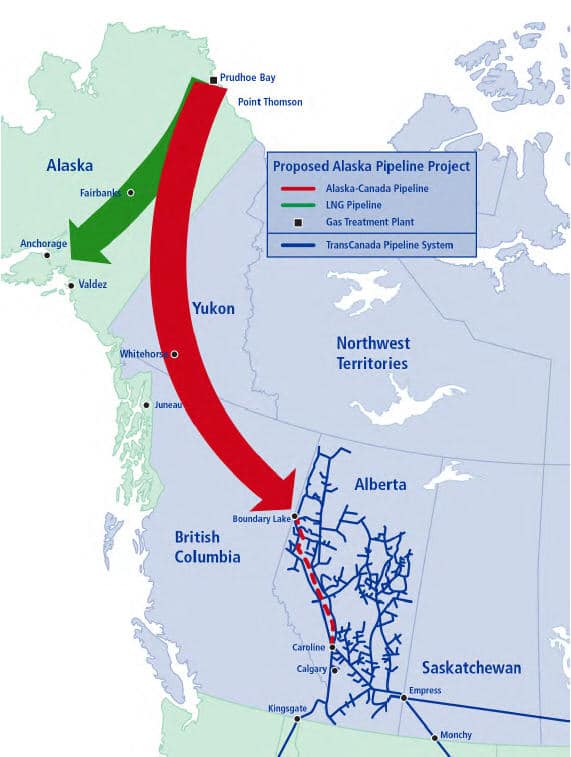
Photo Credit: TransCanada
Things have changed drastically since 2010 in the U.S. gas market though, largely due to the hydraulic fracturing (“fracking”) boom. And with that, the Lower 48 segment of the Alaska Pipeline Project has become essentially obsolete.
Dreams of exporting massive amounts of Alaskan LNG to Asia, however, still remain. They were made much easier on April 14, when the Kenai LNG export facility received authorization to export gas from the U.S. Department of Energy.
Enter the latest iteration of AGDC. This phase began in January 2014 after Governor Sean Parnell, formerly a lobbyist for ConocoPhillips, signed Senate Bill 138 into law.
The bill served as a Memorandum of Understanding (MOU) between Alaska, the AGDC, ConocoPhillips, BP, ExxonMobil, and TransCanada, with the four companies now serving as co-owners of the South Central LNG Pipeline Project.
Gov. Parnell also announced who would serve on the AGDC Board of Directors in September 2013, which began meeting in October 2013. And that’s where the story starts to get more interesting.
Meet Richard “Dick” Rabinow
Under Alaska state law, you have to be a state citizen to serve on state commissions like AGDC. But one of the seven Board members, Richard “Dick” Rabinow, is a citizen of a state far from Alaska: Texas.
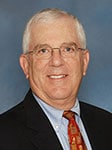
Richard “Dick” Rabinow; Photo Credit: Alaska Gasline Development Corporation
Rabinow is the former president of ExxonMobil Pipeline Company (where he worked for 34 years) and former Chairman of the Trans Alaska Pipeline System (TAPS) Owners Committee. TAPS is co-owned by ExxonMobil, BP, Unocal and ConocoPhillips. He currently lives in Dallas, Texas and runs his own consultancy called Rabinow Consortium, LLC.
Because Rabinow isn’t an Alaskan, major backlash ensued when watchdogs discovered he’s from Texas, which nearly caused him to step down from AGDC‘s Board. Alaska’s Senate Democrats wrote a letter on March 21 calling on Rabinow to step down because his appointment flew in the face of state law.
“Mr. Rabinow is a resident of the state of Texas. Mr. Rabinow is not registered to vote in the state of Alaska. Mr. Rabinow is not qualified to serve as a board appointee here,” read the letter. “[O]ut of respect for the law, we demand that you withdraw Mr. Rabinow’s appointment.”
Importantly, only four members of the 20-member Senate are Democrats.
So just three weeks after the Senate Democrats wrote their letter, the Senate passed HB 383 in a 13-7 vote, which also passed in the House in a 27-12 vote.
Immediately signed by Gov. Parnell on April 16, the law now says that AGDC Board members are “not required to be a registered voter or a resident of the state.”
Democratic House Leader Rep. Christ Tuck was none too pleased with the bill’s passage.
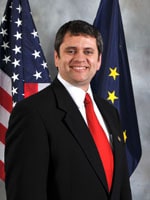
Rep. Christ Tuck; Photo Credit: The Alaska State Legislature
“Alaskans are tired of multinational corporations coming up here and our government catering to them at the expense of Alaskans,” Tuck told the Alaska Dispatch.
Multinational corporations in general are one thing.
But in the case of Rabinow’s former employer ExxonMobil — coined a “private empire” by investigative journalist Steve Coll — it also has ties in Alaska to an out-of-country multinational corporation from Russia: Rosneft.
ExxonMobil: “From Russia with Love”
In February 2013, ExxonMobil offered Russian state-owned oil and gas company Rosneft a 25-percent stake in its portion of the Point Thomson oil and gas field.
Located on Alaska’s North Slope, which contains both onshore and offshore oil and gas, Point Thomson contains 25 percent of the known North Slope gas reserves.
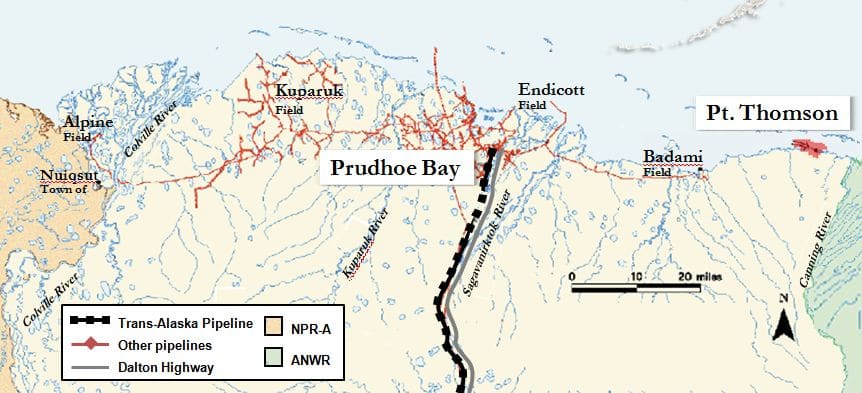
Point Thomson Oil and Gas Field; Map Credit: Alaska Department of Natural Resources
“The agreements signed today bring the already unprecedented scale of Rosneft and ExxonMobil partnership to a completely new level,” Igor Sechin, President of Rosneft said of the deal in a press release at the time. “Participation in the Point Thomson project will increase Rosneft’s access to the latest gas and condensate field development technologies used in harsh climatic conditions.”
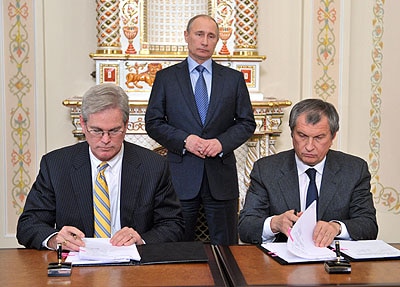
Stephen Greenlee, President of ExxonMobil Exploration Company (L); Russian President Vladimir Putin (C); Igor Sechin, President of Rosneft (R); Photo Credit: Rosneft
Sechin is thought to be high up on the list of potential persons to face sanctions by the U.S. for Russia’s ongoing occupation of Crimea in Ukraine. Easier said than done, of course, given the ties that bind U.S. companies to Russia’s oil and gas industry.
“[I]f anyone apart from Sechin himself is anxious about the prospect of his arrest if he travels to the West, it could be oil companies like BP and ExxonMobil,” wrote investigative reporter Steve Levine recently. “In other words, the US will be going after Sechin, but also a house that the West itself helped to build.”
Given this wheeling and dealing and geopolitical wrangling between the U.S. and Russia resembles something straight out of a James Bond film, perhaps it’s only appropriate that one of the most famous Bond flicks is titled, “From Russia with Love.”
In this ongoing “Great Game,” the controversy that erupted over Rabinow’s appointment appears minor by comparison.
Photo Credit: Wikimedia Commons
Subscribe to our newsletter
Stay up to date with DeSmog news and alerts






